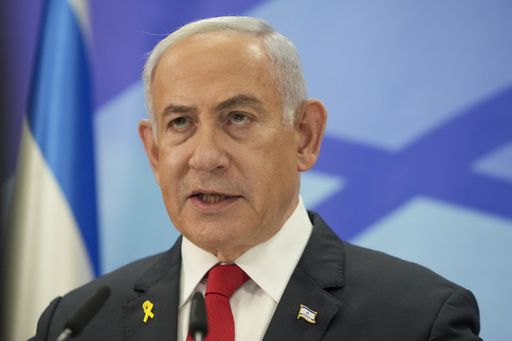JERUSALEM — In a significant turn of events, Israeli Prime Minister Benjamin Netanyahu is scheduled to take the witness stand for the first time in his ongoing corruption trial this Tuesday. This momentous occasion unfolds while Netanyahu simultaneously manages a military conflict in Gaza and contemplates an international arrest warrant related to war crimes.
Netanyahu faces charges of fraud, breach of trust, and bribery across three distinct cases. He has consistently maintained his innocence, yet this trial marks a significant and challenging moment in his extensive political career, contradicting the image of a distinguished and reputable leader he has worked hard to create.
The courtroom proceedings will demand a considerable amount of Netanyahu’s attention during a critical period for the nation. While he presents his defense over several weeks, he is also tasked with overseeing military operations in Gaza, navigating an unstable ceasefire with Hezbollah, and monitoring threats from regional actors, including Iran.
This trial is unprecedented; never before has an Israeli prime minister stepped into a courtroom as a criminal defendant. Throughout the trial, Netanyahu has sought to postpone hearings, citing security concerns and the ongoing conflict in Gaza. However, the judges have insisted the trial resume on Tuesday, opting to hold it in a designated secure underground chamber in Tel Aviv for safety reasons.
Netanyahu’s court appearance may also shed light on additional legal troubles involving some of his close aides, who are currently entangled in scandals related to leaked classified materials and altered documents. Although Netanyahu is not directly implicated in these scandals, they could tarnish his public image.
On the eve of his testimony, Netanyahu held a press conference, his first in three months, where he highlighted Israel’s accomplishments despite over a year of wartime efforts. He also claimed that the ongoing conflicts with Hamas and Hezbollah directly contributed to the fall of Bashar Assad’s regime in Syria.
When pressed about his upcoming testimony, Netanyahu exhibited visible frustration, stating, “I have been waiting eight years for this day, to present the truth.” He accused his detractors of conducting a “political hunt” that he believes has harmed many individuals involved in the case and criticized the media for disseminating falsehoods about him.
As the trial has progressed, it has involved multiple cases where prosecutors contend that Netanyahu traded regulatory benefits for favorable coverage from media moguls and accepted extravagant gifts from a billionaire Hollywood producer. Although the prosecution initially anticipated calling around 300 witnesses, the actual number has fallen to approximately 140.
These witnesses include former close associates of Netanyahu, as well as high-profile figures like former Prime Minister Yair Lapid, various security chiefs, and media personalities. The courtroom has been furnished with thousands of pieces of evidence, such as recordings, documents, and text exchanges, that contribute to the narrative surrounding the allegations.
A recent documentary titled “The Bibi Files” has brought renewed attention to the proceedings, showcasing segments of Netanyahu’s police interrogations and those of his wife and prominent witnesses. In these interviews, Netanyahu displays moments of defiance and tension, frequently claiming that police were unjustly targeting him while disparaging other witnesses.
The prosecution concluded its witness testimonies last summer, paving the way for the defense’s case, with Netanyahu himself serving as its first witness. His appearance will offer the public an opportunity to observe how the long-serving leader addresses the charges before the panel of three judges.
Throughout the trial, the prosecution has aimed to depict Netanyahu as someone who is preoccupied with media portrayal, suggesting he broke the law in pursuit of favorable press. Witness testimonies have revealed insights not only into the allegations at hand but also regarding Netanyahu’s character, suggesting a propensity for a lavish lifestyle funded by taxpayers and affluent supporters.
Some key witnesses have provided critical testimony, including Arnon Milchan, an Israeli film producer known for hits like “Pretty Woman.” Milchan testified via video link about how he routinely provided Netanyahu with expensive gifts, including champagne and cigars.
Unexpectedly, a former top aide retracted earlier allegations against Netanyahu, which could undermine the prosecution’s case. The trial faced additional complications due to recent reports indicating that police utilized advanced phone surveillance technology to monitor this witness.
Moving forward, Netanyahu will be required to testify three days a week for extended periods. The defense intends to portray him as a leader who complies with the law and has been a victim of careless and biased investigations by the authorities.
Critics of Netanyahu argue that these corruption allegations have influenced his decisions, particularly regarding a controversial judicial reform last year that polarized the nation. They assert that the social upheaval and unrest may have led to the vulnerabilities that allowed the October 7 Hamas attack, which ultimately ignited the ongoing conflict.
Families of hostages held by Hamas have accused Netanyahu of prolonging the conflict, asserting that his motivations revolve around avoiding a damaging investigation and potential political defeat. If he loses his position, detachment from the prime ministership may complicate his ability to challenge the justice system and undermine the legitimacy of any judicial outcomes.
Given the slow pace of Israel’s judicial system, a verdict in the trial may not be reached until at least 2026, after which Netanyahu could opt to appeal to the Supreme Court. As the defense nears conclusion, both sides will summarize their arguments before the judges commence deliberations regarding Netanyahu’s fate.
